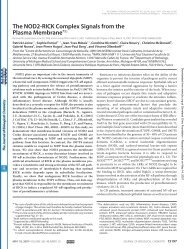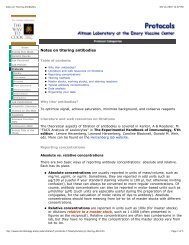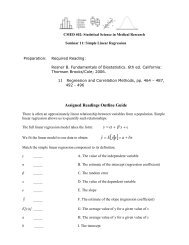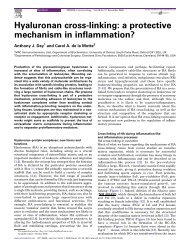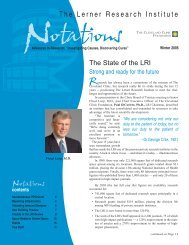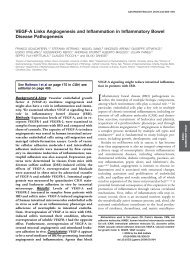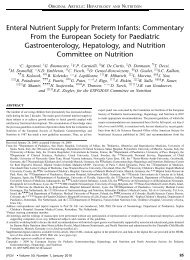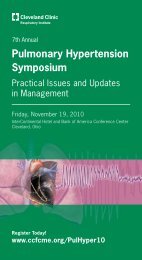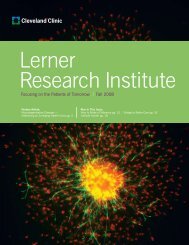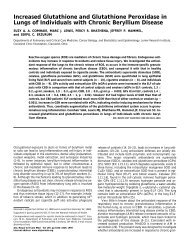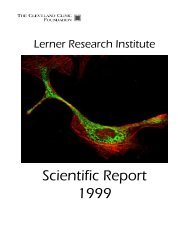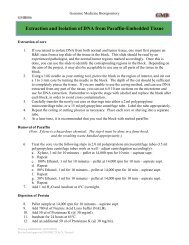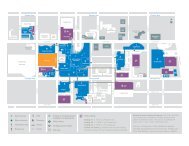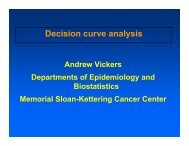DEPARTMENT OFMOLECULARCARDIOLOGYThe Department of Molecular CardiologyMolecular Cardiology: Basic <strong>Research</strong> onCardiovascular DiseasesCHAIRMANEdward F. Plow, Ph.D.The Robert C. Tarazi, M.D.,ChairVICE-CHAIRMANEric J. Topol, M.D.Dept. of CardiovascularMedicine, CCFSTAFFJoan E. B. Fox, Ph.D.Subha Sen, Ph.D.ASSOCIATE STAFFKathleen Berkner, Ph.D.Sadashiva Karnik, Ph.D.Kunio Misono, Ph.D.Dianne M. Perez, Ph.D.Jun Qin, Ph.D.ASSISTANT STAFFTatiana Byzova, Ph.D.Indira Sen, Ph.D.Qing Wang, Ph.D.STAFF SCIENTISTTatiana Ugarova, Ph.D.PROJECT SCIENTISTSJoel Dopp, Ph.D.Tom Haas, Ph.D.Timothy O’Toole, Ph.D.Shaoqi Rao, Ph.D.Olga Stenina, Ph.D.RESEARCH ASSOCIATESKasia Bialkowska, Ph.D.Sudhiranjan Gupta, Ph.D.Rajkumar Kadaba, PH.D.Supriya Patil, Ph.D.Elzbieta Pluskota, Ph.D.Mary Ruehr, Ph.D.Mary Russell, Ph.D.Gong Qing Shen, Ph.D.Olga Vinogradova, Ph.D.Yanwu Yang, Ph.D.JOINT APPOINTMENTFetnat M. Fouad-Tarazi, M.D.Kandice Kottke-Marchant, M.D., Ph.D.Michael Lincoff, M.D.Todor Mazgalev, M.D.Christine Moravec, Ph.D.Joseph V. Nally, Jr. M.D.Norman B. Ratliff, M.D.Patrick Tchou, M.D.David Van Wagoner, Ph.D.118The major goals of the Department ofMolecular Cardiology are:• Continuation of the long-standingtradition at the <strong>Cleveland</strong> <strong>Clinic</strong> Foundation forresearch excellence in the area of cardiovascularbiology.• Development of cutting-edge researchprograms to address significant physiological andpathophysiological mechanisms that occur in theheart and the vasculature.• Maintenance of an active dialogue withclinicians by addressing medically importantproblems.• Provide educational opportunities forstudents and fellows to receive research trainingin cardiovascular biology.To realize these goals, faculty memberswithin the department lead active researchprograms that deal with a broad range ofcardiovascular problems. The types of analysesrange from basic studies of protein structure, tothe dissection of molecular and cellular mechanisms,to investigations conducted in animalmodels and in humans. Currently, the departmentis composed of 20 staff members (Full StaffEdward F. Plow, Ph.D.through the Project Scientist level). <strong>Research</strong>programs in the Department of MolecularCardiology are organized into six major areas ofinterest: hypertension, heart failure, thrombosis,vascular biology, and structural biology andcardiovascular genetics.Hypertension<strong>Research</strong> in the hypertension area seeks tocontinue the tradition of research excellence inthis area established by <strong>Cleveland</strong> <strong>Clinic</strong> investigators,such as Irvine Page, Merlin Bumpus andRobert Tarazi. Studies include the analyses of thestructure and function of the angiotensin I-converting enzyme (ACE), which controlsformation of the regulatory peptide angiotensin II(Dr. I. Sen). Angiotensin II is a focus of theresearch effort in the laboratory of Dr. Karnik,who seeks to understand (a) the mechanisms bywhich this peptide regulates blood pressurethrough its function as a ligand for specificreceptors and (b) the signaling events and cellularresponses initiated by recognition of this ligandby these receptors. The angiotensin receptorsbelong to the large family of seven transmembrane-spanningreceptors. Dr. Perez’s laboratoryis involved in in vitro and in vivo studies to analyzethe basis for ligand recognition, activation and thefunctional consequences ofoccupancy of the adrenergicmembers of this receptor family.Heart FailureThe second major researchemphasis in the department isheart failure. Heart failure hasbecome a major health problem inthe United States, reachingepidemic proportions. Threelaboratories of senior investigators(Drs. S. Sen, Misono andBond) have dedicated researchefforts to meet this challenge. Dr.S. Sen’s laboratory seeks toidentify the molecular playersinvolved in the initiation andprogression of heart failure and todevelop strategies to reverse thetransition from hypertrophy toheart failure. Dr. Bond’slaboratory investigates thesignaling pathways and mechanismsassociated with thesimulation major receptor systemsinvolved not only in the normalphysiologic response of the heartbut also in pathogenic mechanismsof heart failure. Dr. Misono’slaboratory is characterizing atrialContinued on Page 119
The Department of Molecular CardiologyContinued from Page 118natriuretic factor and its receptor at a structurallevel. This ligand-receptor system is believed toplay a central role in the heart failure response.ThrombosisThrombosis remains the leading cause ofdeath in the United States. A better understandingof the molecular mechanisms of thrombosis,hemostasis and fibrinolysis represents a third area ofresearch, emphasized within several laboratories inthe department. The laboratory of Dr. Plow isinterested in the function of the components ofthe plasminogen system, the molecular pathwaythat is responsible for the dissolution of blood clotsand a system that also influences cell migration. Hisstudies use mice in which the genes for variouscomponents of the plasminogen system have beeninactivated, and these knockout mice provide ameans to dissect the role of the plasminogen systemin physiologic and pathophysiologic events.Essential to the function of blood coagulationproteins is their post-translational modification byγ-carboxylation. Dr. Berkner’s lab seeks to definethe regulation of this event and to characterize theresponsible γ-carboxylase. The laboratories of Drs.J. Fox and Plow have major research effortsfocused on the role of platelets in thrombusformation. The receptors that mediate plateletadhesion and aggregation, events that are central tothrombus formation, are under analysis. Dr.Byzova’s laboratory investigates how particularsignaling molecules and events control plateletadhesive responses. Her studies utilize transgenicmouse models to dissect the contributions of thesesignaling molecules.Vascular BiologyVascular biology, the department’s fourtharea of emphasis, is broadly studied throughout the<strong>Lerner</strong> <strong>Research</strong> Institute. Cell adhesion, intracellularsignaling events and pathways and regulation ofthe cytoskeleton represent specific cellular processesthat contribute to complex physiologic andpathophysiologic responses, such as angiogenesis,atherosclerosis and restenosis. Cell adhesionmechanisms are major areas of emphasis within thelaboratories of Drs. J. Fox and Plow. Studies ofligand binding to integrin adhesion receptors andactivation of these adhesion receptors are majortopics of investigation. Dr. Qin, a structuralbiologist (see below), uses NMR to study thestructural basis for integrin activation and celladhesion. A major focus of research in Dr. Byzova’slaboratory is angiogenesis; in vitro and in vivo modelsare utilized to study how growth factors induce thisresponse. Together, these laboratories seek to gaininsights into the processes underlying atherosclerosis,restenosis, and therapies for these diseases.Downstream signaling events and cytoskeletallinkages triggered by activation and occupancy ofthese receptors are areas of intense investigation.Genetic Basis of Cardiovascular DiseaseThe genetic basis of cardiovascular diseasehas evolved into a major theme of research in theDepartment. Dr. Wang’s laboratory is seeking toidentify mutations in genes that cause cardiacarrhythmias and vascular abnormalities in humansand then develops animal and cellular models todetermine how these mutations lead to the abnormalphenotypes. Dr. Topol has organized largemulticenter studies to identify allelic variantsinvolved in premature coronary artery disease andmyocardial infarction. These studies have spurredcollaborations with Dr Wang to find the genesleading to these cardiovascular diseases and withDrs. Plow and Byzova to determine why a singlenucleotide polymorphism in a particular family ofproteins is associated with an increased risk ofcoronary artery disease. Dr Karnik is seeking toidentify polymorphisms within an angiotensinreceptor gene and how these are linked to cardiovasculardisease. Dr. Bond uses gene chip analyses toidentify genes that are altered in human failing hearttissues, to determine if gene expression patterns canbe used to predict the course of heat failure, and toidentify molecular targets that may have a causativerole. Many analyses in the Department involve theuse of transgenic mice in which gene products areoverexpressed or inactivated to dissect how specificproteins known to contribute to cardiovasculardisease exert their functions.Structural BiologyThe above synopsis of ongoing researchactivities within the Department of MolecularCardiology indicates a heavy emphasis on peptideand protein functional analyses. To complementthese endeavors, Dr. Qin, a structural biologist,who studies basic aspects of protein structure andfunction and represent the fifth area of researchemphasis in the Department. Dr. Qin usesnuclear magnetic resonance spectroscopy toanalyze the three-dimensional structure of a widevariety of proteins. Together with facultymembers in various departments throughout the<strong>Lerner</strong> <strong>Research</strong> Institute, Dr. Qin is a member ofa growing body of structural biologists within<strong>Cleveland</strong>’s structural biology community, whoseek to bring these state-of-the-art approaches toprovide high resolution understanding of howprotein molecules work. Knowledge of thethree-dimensional structure of proteins not onlyprovides insights into their modus operandi but alsois key to the future of drug design to target theseproblems.Dept. website: http://www.lerner.ccf.org/moleccard/119



